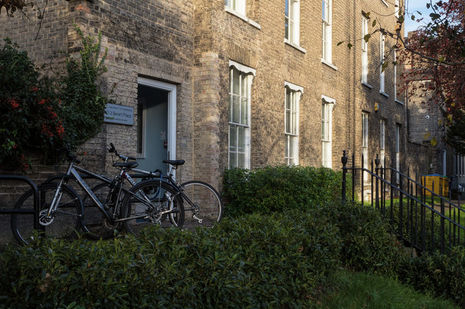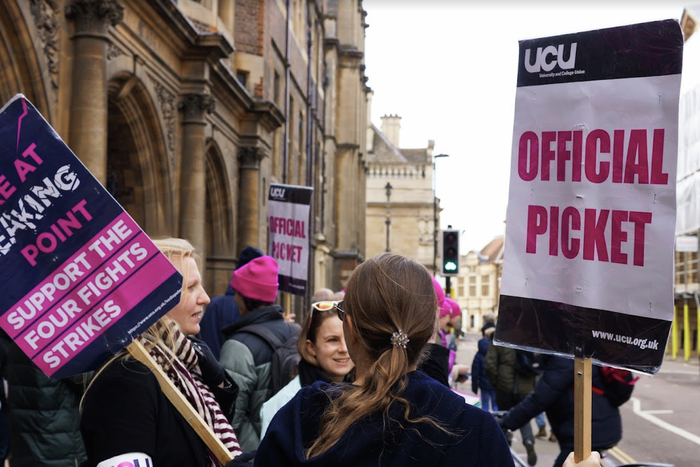The rhetoric around mental health services must change
The UCS refocuses the blame for their unacceptable waiting times onto those seeking help, says Sionna Hurley-O’Kelly

Content Note: This article contains discussion of mental health
On May 24th 2022, Cambridge students received an email from Graham Virgo, Senior Pro-Vice Chancellor, in which they were advised of the mental health support offered by the university. His confident promise of there being “many people” across the University “who can help you” massively overexaggerates the ease with which a student at Cambridge can access mental health services.
“People are denied help in the moments when they need it most”
A student seeking support has five options, according to the email: their college tutor, their director of studies, their college nurse, their college wellbeing officer (JCR or MCR welfare reps), or the University Counselling Service. Of these, only the University Counselling Service guarantees trained counsellors. Some colleges offer internal counselling, but this is a minority. When that student tries to book an appointment with the UCS, however, they are met with a warning that waiting times will be at least six weeks, and longer “if the availability you provide is limited”.
The webpage reads like a Grimm Brothers cautionary tale: “Those who wait longest tend to be people with a very restricted availability or who are requesting appointments later in the day”. Avoid the forest, cut back on gingerbread, and free up your schedules for the UCS. In the five blunt paragraphs that it dedicates to waiting times, the counselling service manages to refocus the blame for their scarcity of resources away from their own inadequacy and onto the alleged obstinacy of the uncooperative student.
Of course, the burden of availability must, at least in part, lie with the person seeking help. It’s unrealistic to expect a counselling service which is in theory subject to upwards of 20,000 students each year to accommodate the exact preferences of everyone who uses it. Again, the unacceptable delay in the provision of appointments – particularly ironic when Virgo’s email professed to offer sources of support during the exam period – is not the subject of my tale. Mental health services are understaffed and underfunded. People are denied help in the moments when they need it most. We know this. There’s nothing new here.
“The UCS redirects the problem of their unacceptable waiting times onto the person seeking help”
The issue is one of rhetoric. I study classics. I have absolutely no fixed time commitments in my life. And a part of me, reading the UCS’s webpage, thought to myself exactly what the statement wanted me to think: “Ha! Such chumps who won’t make time for a counselling appointment. So entitled!” But another, marginally less self-righteous part of my brain recognised how intensely patronising and unfashionably arrogant such an attitude is. One sentence alone captures the condescension: “It is accepted by the University that you prioritise counselling appointments as you would a medical appointment.” Accepted by the University. Do they mean “expected”? Or is their incoherence a bizarre attempt to order the reader about while maintaining the shallow pretence of free will, in the same way that a parent might say to their child, “Now you’re not going to eat that centipede, are you?” Either way, it’s a thinly-veiled scolding. In its stern rebuke of “people with restricted availability”, the UCS redirects the problem of their unacceptable waiting times onto the person seeking help.
And the issue does not stop with Cambridge. Just as an oversubscription for mental health resources is a problem endemic in UK society more broadly, the UCS is not alone in its curt attitude. NHS services prove similarly unaccommodating to those seeking mental health support; not in their online statement, but at an individual level in the approaches of particular doctors, nurses, and administrative staff.
Upon being asked about booking mental health services, one GP receptionist informed me that appointments for “that sort of thing” could not be made in advance. She did not specify exactly when they could be made. The division between mental and physical wellbeing suggested by this receptionist’s language, tone, and reluctance to offer appropriate information presents mental health concerns as extravagant and reinforces the fear, experienced by many of those who use such services, that their claims to NHS time are somehow illegitimate. Such attitudes deepen the embarrassed sense that people looking for mental health support are seeking NHS aid solely to get value for their tax-paying money. The sense that after finding nothing else conceivably wrong with their bodily wellbeing, they are turning to ailments of the spiritual variety.
When a person seeks out mental health support, they don’t generally do so for the sheer thrill of it. They don’t do so in a bid to get a return on their taxes or meet handsome doctors or because mental stability is so damn pedestrian. They do so because they are struggling, and the way they are treated in these moments matters. Long waiting times are a serious problem for the mental health services in this country, and this cannot be solved overnight. The attitude taken towards those booking appointments can, however, be quickly altered. Statements can be rewritten. Staff can be encouraged to take on more compassionate approaches.
There needs to be a move away from the patient-blaming attitudes demonstrated by the UCS among others. The oversubscription of mental health services arrives out of a lack of resources and a failure in management. It is never the fault of those seeking help.
 News / Hundreds of Cambridge academics demand vote on fate of vet course20 February 2026
News / Hundreds of Cambridge academics demand vote on fate of vet course20 February 2026 News / Judge Business School advisor resigns over Epstein and Andrew links18 February 2026
News / Judge Business School advisor resigns over Epstein and Andrew links18 February 2026 News / University Council rescinds University Centre membership20 February 2026
News / University Council rescinds University Centre membership20 February 2026 News / Petition demands University reverse decision on vegan menu20 February 2026
News / Petition demands University reverse decision on vegan menu20 February 2026 News / Caius students fail to pass Pride flag proposal20 February 2026
News / Caius students fail to pass Pride flag proposal20 February 2026










